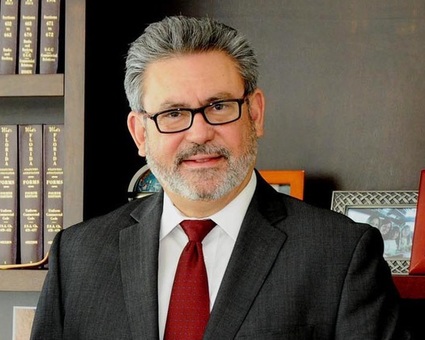Partner Feud Ends in Rebuke of Attorney and a Confidential Settlement
Exceptions to a special magistrate's report aren't likely to reopen the case.
December 15, 2017 at 02:10 PM
5 minute read
 Eduardo Rasco
Eduardo Rasco
The lawsuits and countersuits between feuding partners of the former firm Rosenthal Rosenthal Rasco & Kaplan came to a confidential settlement Saturday, days after a special magistrate filed a report critical of Daniel Kaplan.
The magistrate report filed Dec. 5 found Kaplan owed the firm thousands of dollars and had kept accounts receivable from the firm. Kaplan's lawyer filed exceptions to the report Thursday, saying the magistrate had failed to address Kaplan's claims.
The magistrate's ruling comes four months after Kaplan was chastised by Circuit Court Judge William Thomas. In August, Thomas fined Kaplan $10,000 and granted an emergency motion for contempt against him for violating a temporary injunction in which he had been ordered to refrain from making defamatory remarks against former partner Eduardo Rasco, making further contact with him or violating the confidentiality provision of another case. The court found Kaplan repeatedly sent Rasco rude, abusive emails after the injunction.
“Attorney Kaplan has demonstrated rude, disruptive, harassing and abusive behavior towards Mr. Rasco and his legal associates,” he wrote. “Attorney Kaplan has failed to act with dignity, decency and courtesy consistent with the standard code of conduct requirements imposed upon all members fo the Florida Bar.”
Kaplan had filed suit earlier this year against his former partners, who owned the firm's office space through a separate company, over alleged irregularities in payments related to the real estate and the firm's internal business.
 Kerry Rosenthal
Kerry RosenthalKaplan's suit, filed against Rasco, Kerry Rosenthal and their associated companies, sought judicial dissolution of the firm, more than $15,000 in damages, and claimed that Kaplan's partners made improper distributions and breached their duty of loyalty and care. Rasco, in turn, filed a defamation case. The firm without Kaplan's name attached—Rosenthal Rosenthal Rasco—continues to operate in the same office space.
The report filed by Markenzy Lapointe, one of two special magistrates in the case, found that rather than the firm owing Kaplan money, Kaplan owed the firm $234,355, and fellow partner Rosenthal owed it $7,784.
Lapointe wrote that Kaplan kept income that belonged to Rosenthal Rosenthal by making a series of bartering agreements. In one barter, when a client couldn't pay her bill, Kaplan accepted credit at the client's school uniform store. In another, the client paid him a discounted amount directly and Kaplan wrote off the larger account balance. Other agreements included an unfulfilled barter for tile work, a $700 piece of artwork instead of $6,400 that went unpaid to the firm, and a $55,000 mortgage on behalf of a client that he didn't mention to his partners.
Kaplan's attorney filed numerous exceptions to the report on Dec. 5. His attorney said that thousands owed to Kaplan were not taken into account, and significant sums were written off by his partners as well.
“Many, if not most, of the findings in the RR [report and recommendation] exceed the scope of the Special Magistrate's authority and contain factual and legal errors. Accordingly, the R&R is erroneous and should not be approved by this court,” wrote Kaplan's lawyer, Marcy Resnik, a partner at Kahn & Resnik in Dania.
The firm did not have a written operating agreement, setting up a chief disagreement—whether firm decisions required unanimity or majority rule. Kaplan contends decisions were to be unanimous, and Rasco and Rosenthal made decisions without his approval. Rasco and Rosenthal say the initial agreement was majority rule, and Lapointe's report backed them.
“Before the partnership with Kaplan, Kaplan worked with Rasco and Rosenthal and that firm operated by majority rule,” Lapointe wrote. “That would have crippled the firm's decision-making, with no clear benefit to Rasco and Rosenthal, particularly since they constituted a majority.”
Each of the three partners was to contribute $250,000 of accounts receivable to the new firm and each partner was entitled to one-third of profits with equal salary and benefits, according to Lapointe's report.
In her exceptions to Lapointe's report, Resnik argued the special magistrate failed to consider all the evidence from both parties and exceeded his scope of authority by ruling on whether unanimity was required and addressing a statute of limitations issue. Resnik said the report erred in the analysis regarding payments, didn't properly address Kaplan's claims that the defendants diverted $70,000 or made unauthorized write-offs to Rosenthal Rosenthal clients of more than $600,000.
Resnik also detailed other financial discrepancies in the magistrate's report, including the omission of evidence that many of the Rosenthal and Rasco accounts receivable were never transferred to the firm.
Resnik would not provide further comment on details of the case or exceptions due to the settlement's confidentiality agreement and a confidentiality order entered by JudgeThomas in August.
“We are filing exceptions because we believe the report to be incorrect,” Resnik said. “I don't believe the exceptions will reopen the case, there are just a number of issues that need the courts' attention before we close it out.”
This content has been archived. It is available through our partners, LexisNexis® and Bloomberg Law.
To view this content, please continue to their sites.
Not a Lexis Subscriber?
Subscribe Now
Not a Bloomberg Law Subscriber?
Subscribe Now
NOT FOR REPRINT
© 2025 ALM Global, LLC, All Rights Reserved. Request academic re-use from www.copyright.com. All other uses, submit a request to [email protected]. For more information visit Asset & Logo Licensing.
You Might Like
View All

Holland & Knight Expands Corporate Practice in Texas With Former Greenberg Traurig Partner
3 minute read
Forum Clause Axes $844M Case Against Reinsurer Over Deadly Plane Crash, Judge Rules

Latest Boutique Combination in Florida Continues Am Law 200 Merger Activity
3 minute readTrending Stories
Who Got The Work
J. Brugh Lower of Gibbons has entered an appearance for industrial equipment supplier Devco Corporation in a pending trademark infringement lawsuit. The suit, accusing the defendant of selling knock-off Graco products, was filed Dec. 18 in New Jersey District Court by Rivkin Radler on behalf of Graco Inc. and Graco Minnesota. The case, assigned to U.S. District Judge Zahid N. Quraishi, is 3:24-cv-11294, Graco Inc. et al v. Devco Corporation.
Who Got The Work
Rebecca Maller-Stein and Kent A. Yalowitz of Arnold & Porter Kaye Scholer have entered their appearances for Hanaco Venture Capital and its executives, Lior Prosor and David Frankel, in a pending securities lawsuit. The action, filed on Dec. 24 in New York Southern District Court by Zell, Aron & Co. on behalf of Goldeneye Advisors, accuses the defendants of negligently and fraudulently managing the plaintiff's $1 million investment. The case, assigned to U.S. District Judge Vernon S. Broderick, is 1:24-cv-09918, Goldeneye Advisors, LLC v. Hanaco Venture Capital, Ltd. et al.
Who Got The Work
Attorneys from A&O Shearman has stepped in as defense counsel for Toronto-Dominion Bank and other defendants in a pending securities class action. The suit, filed Dec. 11 in New York Southern District Court by Bleichmar Fonti & Auld, accuses the defendants of concealing the bank's 'pervasive' deficiencies in regards to its compliance with the Bank Secrecy Act and the quality of its anti-money laundering controls. The case, assigned to U.S. District Judge Arun Subramanian, is 1:24-cv-09445, Gonzalez v. The Toronto-Dominion Bank et al.
Who Got The Work
Crown Castle International, a Pennsylvania company providing shared communications infrastructure, has turned to Luke D. Wolf of Gordon Rees Scully Mansukhani to fend off a pending breach-of-contract lawsuit. The court action, filed Nov. 25 in Michigan Eastern District Court by Hooper Hathaway PC on behalf of The Town Residences LLC, accuses Crown Castle of failing to transfer approximately $30,000 in utility payments from T-Mobile in breach of a roof-top lease and assignment agreement. The case, assigned to U.S. District Judge Susan K. Declercq, is 2:24-cv-13131, The Town Residences LLC v. T-Mobile US, Inc. et al.
Who Got The Work
Wilfred P. Coronato and Daniel M. Schwartz of McCarter & English have stepped in as defense counsel to Electrolux Home Products Inc. in a pending product liability lawsuit. The court action, filed Nov. 26 in New York Eastern District Court by Poulos Lopiccolo PC and Nagel Rice LLP on behalf of David Stern, alleges that the defendant's refrigerators’ drawers and shelving repeatedly break and fall apart within months after purchase. The case, assigned to U.S. District Judge Joan M. Azrack, is 2:24-cv-08204, Stern v. Electrolux Home Products, Inc.
Featured Firms
Law Offices of Gary Martin Hays & Associates, P.C.
(470) 294-1674
Law Offices of Mark E. Salomone
(857) 444-6468
Smith & Hassler
(713) 739-1250






